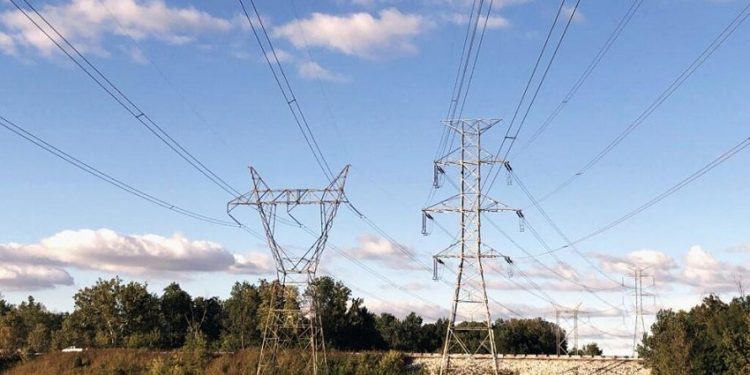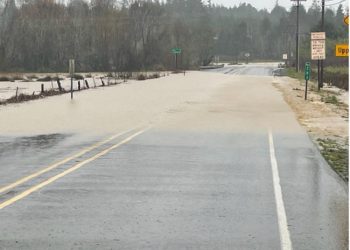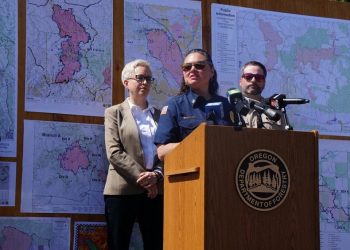Astoria, OR – Oregon lawmakers have made a significant revision to House Bill 3666, a piece of legislation aimed at increasing wildfire mitigation efforts across the state. The amendment, introduced Tuesday in the House Committee on Judiciary, clarifies the intent of the bill and addresses concerns that it could unintentionally offer utilities immunity from liability in lawsuits arising from wildfires sparked by power lines.
The bill, which was initially met with strong opposition from some quarters, seeks to implement stringent wildfire prevention standards for electric utilities. In exchange for meeting these standards, utilities would receive an annual wildfire safety certificate. However, critics feared that the original language of the bill could be interpreted as giving utilities immunity from lawsuits, even in cases where their equipment was responsible for catastrophic fires.
The controversy centered around a provision in the original version of the bill, which stated that the wildfire safety certificate would demonstrate that a utility had “acted reasonably” in accordance with wildfire safety practices. Opponents, including lawyers and consumer protection groups, expressed concern that such language could allow utilities to claim they were adhering to safety standards, even if their equipment caused deadly fires like those that devastated Oregon in 2020.
Rep. Pam Marsh, D-Ashland, the bill’s primary sponsor, introduced the amendment to clarify the intent of the legislation. The revised language now specifies that the certificate simply confirms that a utility’s policies and practices were consistent with the Oregon Public Utility Commission’s wildfire safety standards at the time the certificate is issued, rather than implying that the utility is free from liability in the event of a wildfire caused by its equipment.
“We never intended for this bill to provide immunity to utilities in the event that their equipment causes a fire,” Marsh said during the committee meeting. “The goal has always been to set a high standard for wildfire mitigation and to keep our communities safe.”
While the amendment has alleviated some concerns, others remain. The Oregon Trial Lawyers Association, along with some representatives from the timber industry, argue that the bill still fails to grant the Public Utility Commission the authority and resources needed to effectively enforce wildfire prevention regulations. They have also raised concerns that the certificates could still be used in court to defend utilities, despite the revision.
Cody Berne, a representative of the Oregon Trial Lawyers Association, criticized the bill’s enforcement provisions. “If the goal is safety, this bill won’t accomplish it,” he said. “It simply recycles existing fire safety rules without providing the necessary resources to ensure utilities are following those rules.”
The 2020 Labor Day wildfires, which were triggered by power lines and killed 11 people while destroying thousands of homes, have remained a key point of contention in discussions surrounding wildfire liability. In 2023, a Multnomah County jury found PacificCorp, the owner of Pacific Power, guilty of being reckless and negligent in relation to the fires. The company was ordered to pay over $1 billion in settlements to those affected by the disaster.
Rep. Marsh emphasized that the bill is designed to prevent future tragedies by establishing clear and enforceable wildfire safety standards. “This legislation is about making sure we don’t repeat the mistakes of the past,” she said.
Electric utilities, including Portland General Electric and the Oregon Rural Electric Cooperative Association, have expressed their support for the bill, arguing that the certification process will provide a framework for consistent and effective wildfire prevention efforts. Keith Brooks, general manager of Douglas Electric Cooperative, warned that without a clear certification process, utility rates could skyrocket, leading to economic displacement in communities already struggling to cope with rising living costs.
While the amendment has made the bill more palatable to some, the debate over its effectiveness in ensuring true accountability for utilities is far from over. Lawmakers are now tasked with addressing the concerns of both utility companies and wildfire survivors, while balancing the need for clear mitigation standards with the imperative of holding utilities accountable for their role in causing wildfires.
As the bill moves forward, the focus remains on finding solutions that protect Oregon’s communities from the increasing threat of wildfires, while ensuring that those responsible for such disasters are held to the highest standards of safety and accountability.













